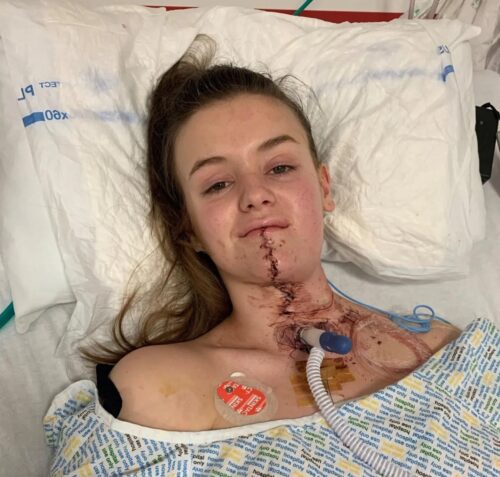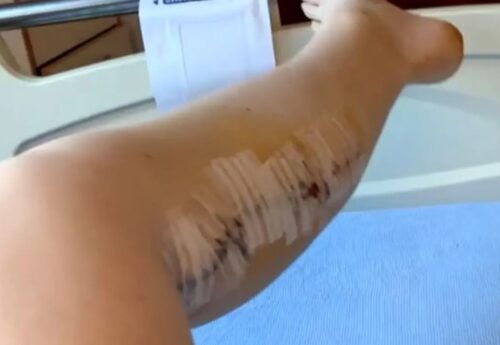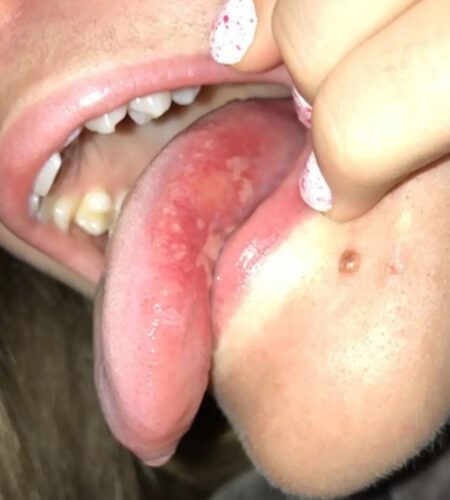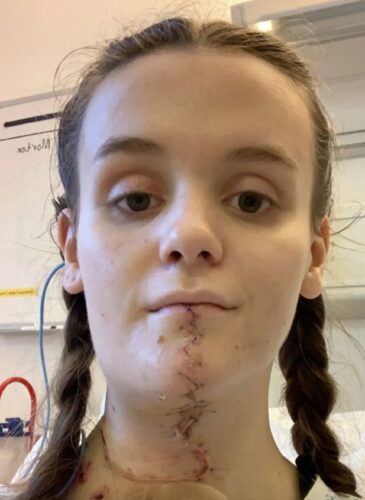Source: nypost.com
Author: Brooke Steinberg
A college student with ulcers blamed it on stress from exams — but ended up needing to have the majority of her tongue removed and then reconstructed when it turned out to be cancer.
Rachel Morton from Edinburgh, Scotland, started noticing ulcers on her tongue in 2019, and initially thought they were a result of stress.
“When I’m a bit tired, run down or stressed with exams I seem to be a bit prone to ulcers anyway, so I kind of just put it down to that and starting university,” Morton explained. “I went to the doctor and I’d been given some pain relief tablets, Bonjela and stuff like that.”
But after a year, her condition worsened.
“I still had them a year later but I wasn’t too worried about it. I had so much other stuff going on in my life and it wasn’t really at the forefront of my mind,” she told Kennedy News and Media.
“At the start it was a couple of ulcers, but over the course of a year they got bigger and spread, and covered the whole side of my tongue. They were really red, raw and painful.”

Rachel Morton ended up needing to have her tongue removed and reconstructed when her ulcers turned out to be cancer. Kennedy News and Media
Morton, now 21, was also experiencing strange symptoms such as extreme tiredness; dry, red and swollen lips; tonsil aches; and abnormal feeling in the left side of her face. She couldn’t poke her tongue out of her mouth.
“I had tongue ulcers over my 18th birthday,” she said. “I couldn’t really drink alcohol because they were so sore.”
She went to get it checked out by many doctors and a dentist, and was prescribed antibiotics. One doctor even told her “there’s actually nothing else that we can do.”
“By that point I started getting really bad tonsil aches. I felt like I had a sinus infection or ear infection. Everything on the left side of my face and neck felt off,” she recalled.
She was being tested for a wide range of conditions, including hemochromatosis, a hereditary disorder that causes the body to built up too much iron, according to the CDC.
Morton was eventually referred for a biopsy, which revealed she had tongue cancer at 19 years old.
“The biopsy was probably one of the worst experiences of the whole thing — it was absolutely horrific. You’re lying there, they numb you, obviously, but it’s the sound of the scissors cutting your tongue. Because it’s such a strong muscle, it really took a lot of force,” she said.
Morton shared that she knew she had cancer the moment the doctors called her saying it was urgent.
“We went into the surgeon’s room and he had a box of tissues sitting there. There were all these little [cues] that made me think, ‘Oh, OK. I know what’s going on now,’ ” she said. “He’d never actually spoken to someone as young as me with tongue cancer. He said he’s only ever treated those over the age of 60, usually male, that have smoked and drank their entire life.”
According to the National Organization for Rare Disorders, tongue cancer is indeed most common in men over the age of 60. It’s rare in people — particularly women — under the age of 40.
“As he was telling me that I had cancer, I don’t remember this but my mom does, he had this rash coming up as he was trying to tell us because he was just so uncomfortable. I felt sorry for him because it was a horrible situation,” Morton shared.
“It was a really surreal experience. You go into survival mode. You think, ‘OK, this is reality, this is what’s going to happen, and I’ll get through it.’ ”
Tongue cancer begins with the cells of the tongue and can occur in two places: in the mouth (oral cancer) or in the throat (hypopharyngeal cancer), according to Mayo Clinic.
After she was diagnosed, Morton had to endure 10 different surgeries within a 16-hour time frame. According to Kennedy News, this included breaking her jaw, removing two-thirds of her tongue, lymph nodes and blood supply that could carry malignant cells.
The surgeons then used muscle and blood vessels from her thigh to reconstruct her tongue and the arteries and veins in her neck.

Morton’s leg — here seen five days post-surgery — was used to reconstruct part of her mouth and neck.
Kennedy News and Media
Post-surgery, Morton had to relearn how to walk and talk — but she didn’t let that hold her back from studying and attending online lectures, which she resumed just four days later.
The dancer and baker went through two rounds of chemotherapy, 30 rounds of radiotherapy and six months of speech therapy before officially being told she was clear of cancer in June 2021.
Morton now has what she called a “Harry Potter”-like scar on her chin, a tracheostomy scar, and scars up her neck, stomach and leg.
“I really like my scars. It’s really important to incorporate them as [part of] who I am and I feel really proud,” Morton told Kennedy News. The student, who is interested in being a psychiatrist, has learned to embrace her scars and said she doesn’t really wear makeup to cover them.
“I feel proud of my body for being able to come through this. My scars are a part of me and they will be for the rest of my life, and it shows how resilient, strong and powerful my body is, and I want to reflect that within and do myself justice,” she said.
Morton is now involved in raising awareness of symptoms of tongue cancer and is a member of the UK’s Teenage Cancer Trust.
“For those feeling that something’s not right, trust your intuition. If your body’s telling you something’s not right, it probably isn’t. We know ourselves … Advocate for yourself — it’s hard, but you need to do it,” she advised.
She’s also urging doctors to think outside the box.
“One of my key messages for medical professionals would be for them to look beyond the textbook. We’re taught in medical school that this, this and this equals this, but that’s not how life is — everyone’s so different and no body is the same, so how can we reduce that to a textbook?” Morton said.



Leave A Comment
You must be logged in to post a comment.